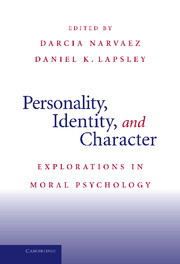Book contents
- Frontmatter
- Contents
- Contributors
- Introduction
- 1 The Moral Personality
- 2 The Moral Functioning of the Person as a Whole: On Moral Psychology and Personality Science
- 3 Moral Science? Still Metaphysical After All These Years
- 4 Cultural Pluralism and Moral Identity
- 5 Neuroscience and Morality: Moral Judgments, Sentiments, and Values
- 6 Triune Ethics Theory and Moral Personality
- 7 Early Foundations: Conscience and the Development of Moral Character
- 8 The Development of the Moral Personality
- 9 Urban Neighborhoods as Contexts for Moral Identity Development
- 10 Moral Personality Exemplified
- 11 Greatest of the Virtues? Gratitude and the Grateful Personality
- 12 The Elusive Altruist: The Psychological Study of the Altruistic Personality
- 13 Growing Toward Care: A Narrative Approach to Prosocial Moral Identity and Generativity of Personality in Emerging Adulthood
- 14 Moral Identity, Integrity, and Personal Responsibility
- 15 The Dynamic Moral Self: A Social Psychological Perspective
- 16 The Double-Edged Sword of a Moral State of Mind
- 17 Moral Identity in Business Situations: A Social-Cognitive Framework for Understanding Moral Functioning
- 18 The Moral Functioning of Mature Adults and the Possibility of Fair Moral Reasoning
- 19 Moral Personality: Themes, Questions, Futures
- Author Index
- Subject Index
19 - Moral Personality: Themes, Questions, Futures
Published online by Cambridge University Press: 05 June 2012
- Frontmatter
- Contents
- Contributors
- Introduction
- 1 The Moral Personality
- 2 The Moral Functioning of the Person as a Whole: On Moral Psychology and Personality Science
- 3 Moral Science? Still Metaphysical After All These Years
- 4 Cultural Pluralism and Moral Identity
- 5 Neuroscience and Morality: Moral Judgments, Sentiments, and Values
- 6 Triune Ethics Theory and Moral Personality
- 7 Early Foundations: Conscience and the Development of Moral Character
- 8 The Development of the Moral Personality
- 9 Urban Neighborhoods as Contexts for Moral Identity Development
- 10 Moral Personality Exemplified
- 11 Greatest of the Virtues? Gratitude and the Grateful Personality
- 12 The Elusive Altruist: The Psychological Study of the Altruistic Personality
- 13 Growing Toward Care: A Narrative Approach to Prosocial Moral Identity and Generativity of Personality in Emerging Adulthood
- 14 Moral Identity, Integrity, and Personal Responsibility
- 15 The Dynamic Moral Self: A Social Psychological Perspective
- 16 The Double-Edged Sword of a Moral State of Mind
- 17 Moral Identity in Business Situations: A Social-Cognitive Framework for Understanding Moral Functioning
- 18 The Moral Functioning of Mature Adults and the Possibility of Fair Moral Reasoning
- 19 Moral Personality: Themes, Questions, Futures
- Author Index
- Subject Index
Summary
In this final chapter we reflect on some of the themes that resonate throughout the volume, but also raise some enduring questions for the field of moral personality, and some possible future lines of research.
THEMES
A primary theme of the volume is that traditional ways of carving up the disciplines is no longer a productive way to investigate moral personality. There is something about the rhythm of science that seeks integrative frameworks, and there is now a palpable movement toward engaging broader perspectives that cross traditional disciplinary boundaries. The disjunction between trait dispositional and social-cognitive approaches to personality, for example, no longer seems forbidding. A second example is McAdams' new Big Five framework that was designed to provide a unifying framework to personality science, but ends up rich with implications for lifespan development research as well, as several chapters attest in the present volume. There is a convergence of meta-theoretical perspectives on person-context transactions that unify the work of personality, social, and developmental researchers. And within developmental science there is a blueprint for merging social and cognitive developmental research in a way that makes contact with the study of social cognition in adults. The study of moral personality, then, is a topic that is inherently interdisciplinary, much in the way that cognitive science necessarily brings together scholars from many fields of study.
A second theme is that the foundations of the moral self are laid early in development. By the second birthday, and certainly as toddlers, an increasing dispositional stability emerges that has significance for prosocial behavior and moral development.
- Type
- Chapter
- Information
- Personality, Identity, and CharacterExplorations in Moral Psychology, pp. 441 - 448Publisher: Cambridge University PressPrint publication year: 2009
- 4
- Cited by



